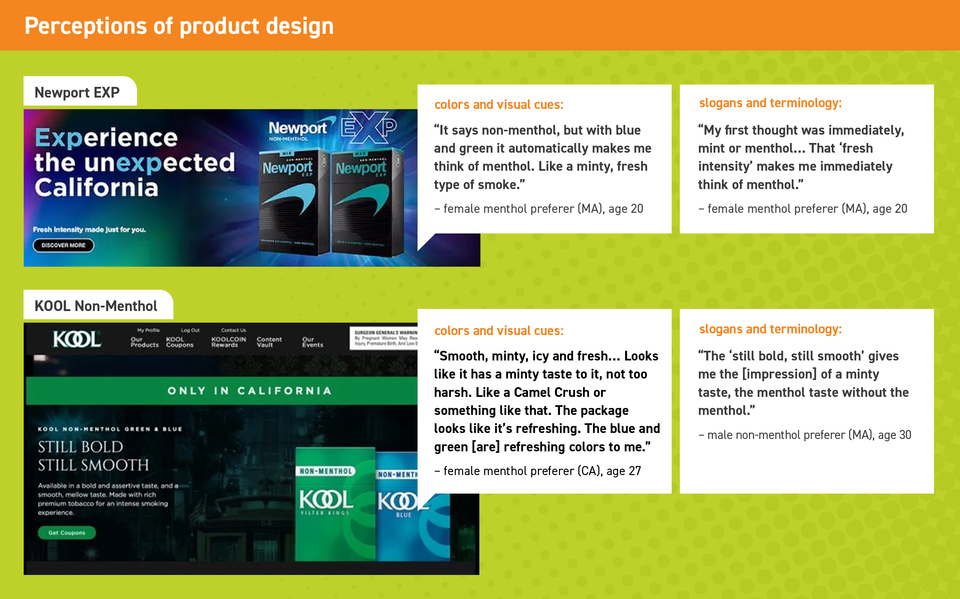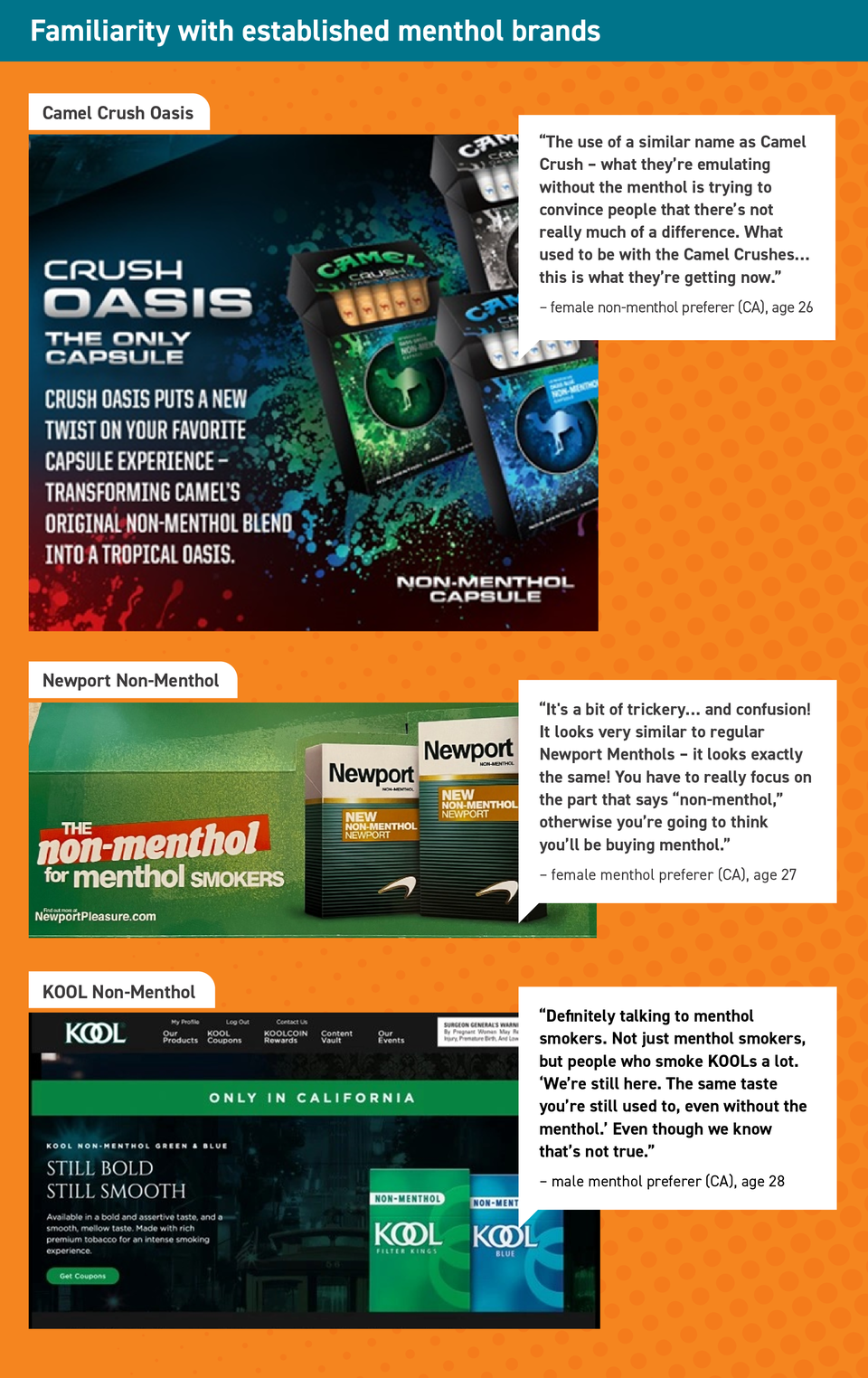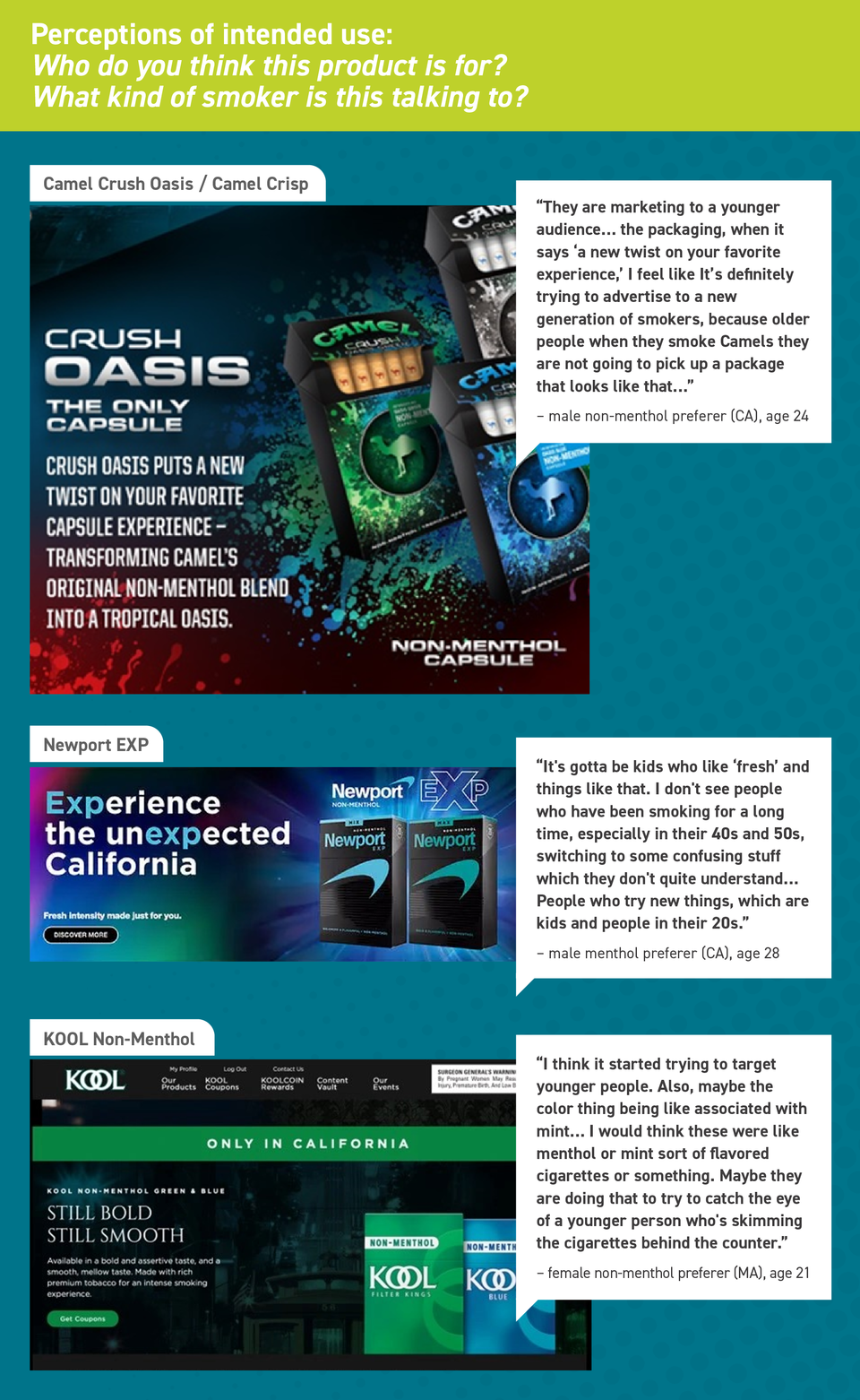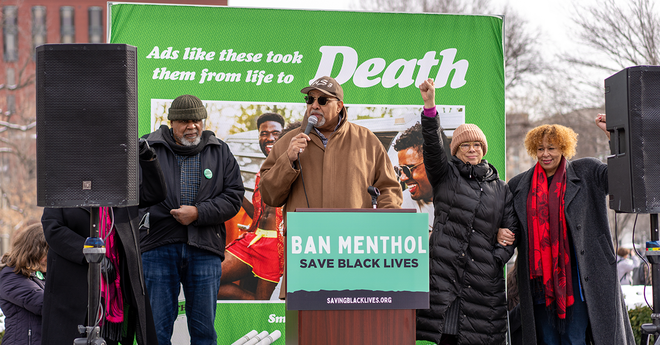“I’m assuming it has a minty taste”: Young smokers’ reactions to ads for new non-menthol cigarettes in California and Massachusetts
Young adult smokers overwhelmingly felt that ads and packaging for new cigarettes like Camel Crisp, Newport Non-Menthol, and Kool Blue primed smokers to expect minty- or menthol-flavored cigarettes, according to qualitative research by Truth Initiative®. Participants in focus group discussions perceived that the ads would appeal to young people and new smokers, raising concerns that the products may help recruit new users to a life-long nicotine addiction.
After Massachusetts and California successfully ended the sale of flavored tobacco and nicotine products, including the sale of menthol flavored cigarettes, tobacco companies pivoted to marketing new “non-menthol” cigarettes in these states. These cigarette brand variants are advertised with the same green and blue hues typically used to advertise menthol-flavored cigarettes with slogans evoking a menthol flavor experience like “still bold, still smooth,” and “fresh intensity.” Recently published research shows that these products contain synthetic cooling chemicals in place of menthol to achieve similar cooling sensory effects.
While the Truth Initiative study did not test if the new cigarettes tasted or smelled like menthol, the results indicate that young smokers perceive them to be menthol products based on the ads and packaging. Advertising that implies that cigarettes are similar to menthol undermines both the letter and spirit of flavor restrictions. The U.S. Food and Drug Administration (FDA) is working to end the sale of menthol cigarettes and flavored cigars, with new rules currently with the White House for final review.
Asking smokers what they think about ads for new non-menthol cigarettes introduced in CA, MA
Truth Initiative commissioned focus groups in July 2023 using ads for new Camel, Newport, and KOOL “non-menthol” brand variants to get a sense of what young adult smokers thought about ads for these new “non-menthol” cigarettes. Truth Initiative partnered with the independent qualitative research firm Colloquial Insights to conduct focus groups with 26 current smokers between the ages of 18-30 living in California or Massachusetts, the first U.S. states to remove menthol-flavored nicotine and tobacco products, and where the tobacco industry introduced new non-menthol brand variants into the cigarette market. [See sidebar on “Evolving policies on menthol flavored cigarettes.”]
Researchers divided participants according to whether they were menthol smokers and those who did not smoke menthols, based on the flavor of their usual brand before the removal of menthol flavors. Participants were shown ads for the new non-menthol cigarettes Camel Crisp, Camel Crush Oasis, Newport Non-Menthol, Newport EXP, Kool Blue, and Kool Non-Menthol and were asked about prior awareness, expected flavors and sensations, who they thought would like the product, and if they expected to like it, based on the product ads and packaging. Although focus groups tend to include a small number of participants and do not represent a broad population, they provide valuable insights from real people on how they encounter, perceive, and experience products, ads, and messaging.
Evolving policies on menthol flavored cigarettes
Massachusetts and California became the first states to implement strong tobacco and nicotine product flavor policies in 2020 and 2022, respectively. Both state policies prohibit the sale of most tobacco and nicotine products with “characterizing flavors” — including menthol cigarettes. According to the policies in both states, a tobacco product is assumed to be flavored if the product labeling or packaging implies that the tobacco product has a characterizing flavor.
The FDA has proposed a rule to remove menthol from cigarettes and flavored cigars in the U.S., a policy that is anticipated to save lives. Policies that restrict the sale of menthol and other additives which lend characterizing flavors to tobacco products can prevent young people from starting to smoke, since flavors are proven to attract young people. As rules move closer to finalization, the FDA should consider the demonstrated menthol-like advertising themes for new non-menthol flavored cigarettes.
Ads for new non-menthol cigarettes build expectations for a menthol product
Participants overwhelmingly felt the new non-menthol ads and packaging cued them to think of menthol products, repeatedly citing the green and blue hues used in the ads as evoking marketing strategies for menthol cigarettes. As one Massachusetts resident (male non-menthol preferer, age 30) noted, “green and blue are the classic colors for menthol.” This sentiment was shared by most respondents, regardless of menthol preference. Slogans such as “still bold, still smooth” or “fresh intensity” as well as visual design components like white lettering with green and blue graphics and water or crystal imagery also prompted expectations of minty taste and/or cooling sensation. Young adult smokers in the focus groups repeatedly used the terms “fresh,” “minty,” “refreshing,” and “smooth” to describe the range of new non-menthol products – words that are typically reserved for menthol cigarettes.
“Trickery” and “confusion”: Participants are quick to call out the resemblance to menthol products
Ads for non-menthol Camel Crisp and Camel Crush Oasis immediately created associations with the menthol product Camel Crush for participants who prefer menthol.
The ad for Newport Non-Menthol mimicked traditional Newport advertising, setting an expectation of a menthol or “Newport-like experience.” Similarly, for Newport EXP, the Newport branding, blue color scheme and “fresh intensity” in the ad copy prompted assumptions that the product would be a menthol-type product.
Ads for Newport Non-Menthol felt subtle in their communication about being non-menthol, with the non-menthol labeling easily overlooked because of strong and familiar menthol cues in the ads including blue and green imagery.
New non-menthol cigarette ads appeal to youth
Participants reported that several ads would likely appeal to younger people, new smokers, or experimental smokers who might be open to trying new brands, noting the attention-grabbing contrast between dark backgrounds and bright colors. Ads for Newport EXP and KOOL Non-Menthol reminded participants of a nightclub or partygoing lifestyle. One California smoker said such ads would appeal to social smokers: “… the background looks like you are hanging out at a party.” (female, age 28, menthol preferer). “It looks like it’s targeted to kids,” said one Massachusetts participant (male, age 20, non-menthol preferer) about the ads for Camel Crush Oasis and Camel Crisp.
Some participants felt the ads would not appeal to and may even confuse older smokers who are more established in their brand preferences: “I don’t see people who have been smoking for a long time, especially in their 40s and 50s, switching to some confusing stuff which they don’t quite understand,” one participant (male, age 28, menthol preferer) commented about Newport EXP.
The tobacco industry’s history of evading policies restricting flavored products demands action
New non-menthol cigarettes are just one product in a litany of examples of the tobacco industry finding loopholes to continue selling their addictive and deadly products. Recent examples include tobacco companies releasing a proliferation of flavored disposable e-cigarettes as well as oral nicotine products claiming to contain synthetic nicotine to circumvent FDA regulations on nicotine derived from tobacco.
In the case of the new non-menthol cigarettes featured in this study, advertising that implies a characterizing flavor undermines the intention of policies restricting menthol. Such practices may encourage trial interest among youth who have no previous experience with the brands’ flavored predecessors, particularly when combined with high-quality, attention-getting graphic design elements.
As the FDA takes steps to finalize the new rule restricting menthol cigarettes and flavored cigars in the coming weeks and months, it must ensure that the final rule does not create loopholes that are easily exploited by an industry that will stop at nothing to keep its products on the market.






